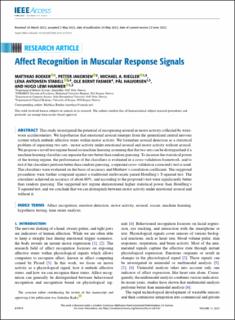Affect Recognition in Muscular Response Signals
Boeker, Matthias; Jakobsen, Petter; Riegler, Michael; Stabell, Lena Antonsen; Fasmer, Ole Bernt; Halvorsen, Pål; Hammer, Hugo Lewi
Peer reviewed, Journal article
Published version
Permanent lenke
https://hdl.handle.net/11250/3098821Utgivelsesdato
2023Metadata
Vis full innførselSamlinger
Sammendrag
This study investigated the potential of recognising arousal in motor activity collected by wrist-
worn accelerometers. We hypothesise that emotional arousal emerges from the generalised central nervous
system which embeds affective states within motor activity. We formulate arousal detection as a statistical
problem of separating two sets - motor activity under emotional arousal and motor activity without arousal.
We propose a novel test regime based on machine learning assuming that the two sets can be distinguished if a
machine learning classifier can separate the sets better than random guessing. To increase the statistical power
of the testing regime, the performance of the classifiers is evaluated in a cross-validation framework, and to
test if the classifiers perform better than random guessing, a repeated cross-validation corrected t-test is used.
The classifiers were evaluated on the basis of accuracy and Matthew’s correlation coefficient. The suggested
procedures were further compared against a traditional multivariate paired Hotelling’s T-squared test. The
classifiers achieved an accuracy of about 60%, and according to the proposed t-test were significantly better than random guessing. The suggested test regime demonstrated higher statistical power than Hotelling’s
T-squared test, and we conclude that we can distinguish between motor activity under emotional arousal and without it.

